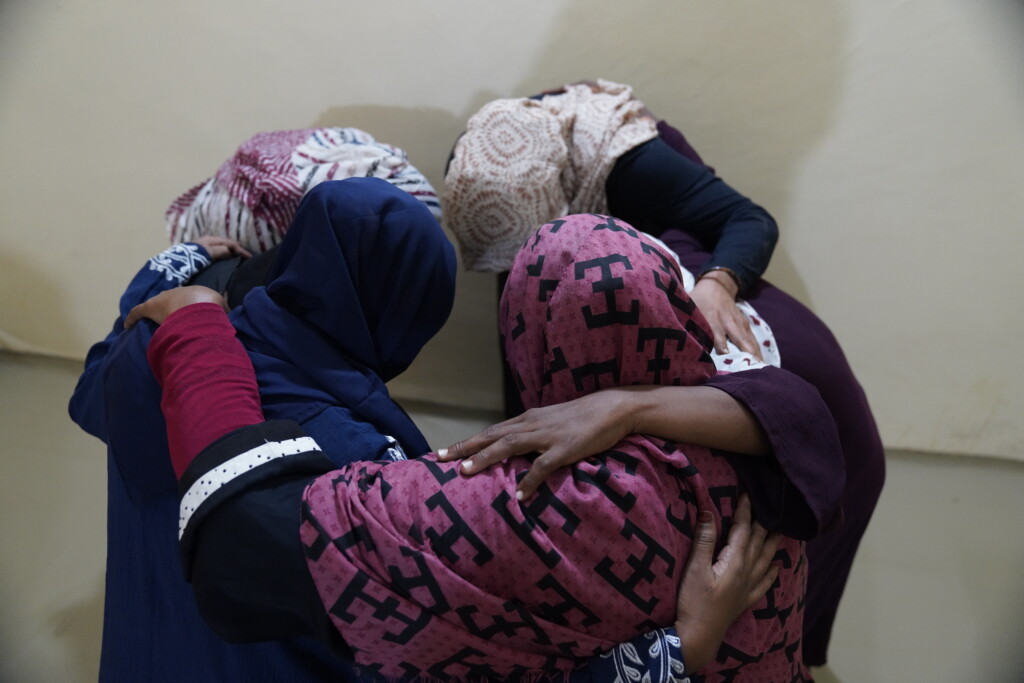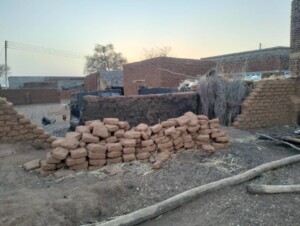World Mental Health Day 2025: War-torn Sudan’s mental breakdown

Frontline workers at a women-led organisation working on gender-based violence and child protection in Sudan (File photo: UNICEF / Tess Ingram)
By Iman Ibrahim
Sudan faces one of the world’s deepest mental health crises as war, displacement, and trauma reshape the nation’s psychological landscape. As the world marked World Mental Health Day 2025 #WorldMentalHealthDay2025 on Friday, under the theme Mental Health in Humanitarian Emergencies, Sudan embodies that reality. Nearly three years of war between the Sudanese Armed Forces (SAF) and the Rapid Support Forces (RSF) have displaced more than 10.8 million people, forced for million to flee abroad, and left hospitals and health facilities in ruins. The World Health Organization. warns that nearly all those affected by humanitarian emergencies experience psychological distress, with one in five likely to develop a mental disorder.
Sudan’s invisible wounds, measurable harm
Sudan’s humanitarian crisis, now in its third year, has displaced people and destroyed what remains of its health infrastructure. Hospitals have been looted or bombed, and millions have been cut off from essential services. As the humanitarian emergency deepens, mental health has become both a medical and social casualty. The collapse of the healthcare system has left patients, families, and professionals in survival mode.
Meanwhile, doctors and health workers continue to operate under relentless pressure. In July 2024, MSF evacuated its “exhausted” team from Khartoum’s Turkish Hospital after repeated armed incursions and a government blockade that stopped medical supplies and staff rotations, halting surgeries and leaving ministry staff to keep the facility barely running. That same month, WHO warned that less than a quarter of health facilities in the hardest hit states were functional, underscoring the load borne by the few remaining clinicians.
At the same time, older people face a quieter, chronic suffering. A 2025 Lancet Healthy Longevity study warned that older adults in Sudan are among the most clinically vulnerable groups, facing disrupted healthcare systems, scarcity of resources, and rising psychosocial stress. The author notes that the collapse of healthcare infrastructure has left many elderly people without access to essential medicine or mental health care, exacerbating what he calls “an unspoken emergency of longevity.”
Across displacement camps, children bear the emotional weight of interrupted childhoods In 2024, Radio Dabanga detailed Sudanese children expressing war time trauma through drawings, scenes of violence, fear, and loss, reflecting widespread sadness, anxiety, and nightmares among displaced pupils as education and safety collapsed around them. By March 2025, a UNICEF report confirmed that nearly 19 million children were out of school, many showing signs of trauma, nightmares, and anxiety linked to airstrikes and displacement. In overcrowded shelters, childhood fear has become routine, and play has turned into survival.
Within the education system, teachers endure their own psychological strain. Between 2023 and 2024, Radio Dabanga’s coverage of education strikes showed teachers working without pay in destroyed schools or displacement centres, trying to comfort students while coping with their own trauma. The classroom, once a safe space, has turned into a site of collective endurance, where teaching often doubles as therapy.
Meanwhile, women experience compounded trauma from sexual violence, digital harassment, and insecurity of displacement. Reports by Human Rights Watch in July 2024 and UN Women in April 2025 document rising cases of sexual assault and the psychosocial fallout that follows. In Darfur, Médecins Sans Frontières continued throughout 2024 to operate trauma counselling and post rape care units for survivors during extreme insecurity. Each testimony adds to the growing record of women’s mental health being both weaponised and ignored in the war’s aftermath.
Finally, humanitarian staff themselves are breaking under the strain. In 2025, reports from OCHA and WHO EMRO warned that Sudanese aid workers faced burnout, grief, and exposure to violence, often operating without rest or psychological support. Their struggle marks the thin line between survival and service, the mental toll of healing others while living through the same war.
Sudanese and global efforts hold the front line
Amid this devastation, Sudanese and global responders continue to fight for psychological survival. Sudan’s recovery now depends on a network of counsellors, therapists, volunteers, and international organisations working with almost no infrastructure left intact.
At the national level, Sudanese-led initiatives such as the Trauma Recovery Organisation Sudan and Bit Makli Organisation have continued to deliver remote counselling and psychosocial support, even as many of their members have themselves been displaced. These networks provide essential mental health first aid, community healing circles, and resilience training in safe zones across Eastern Sudan and Darfur. Their unpaid labour and peer-led methods have sustained vital connections between displaced communities and the fragmented health system.
From the earliest months of the war, Sudan’s volunteer networks became the backbone of survival. Across Khartoum, Darfur, and the East, the Emergency Response Rooms (ERRs) mobilised to provide food, shelter, and medical care, but also psychological first aid and community counselling when formal services collapsed. What began as spontaneous neighbourhood action has evolved into a nationwide web of civilian protection and psychosocial solidarity.
As local initiatives multiplied, digital spaces began filling the mental health vacuum. The B’Sarahah Mental Health Initiative, a youth-led platform founded in 2022, expanded during 2023 to offer peer-led psychoeducation and group therapy online, helping Sudanese of all ages process trauma through digital counselling. Its official hub continues to consolidate access to virtual support channels, encouraging open dialogue on trauma, resilience, and wellbeing.
By mid-2024, community-led peer counselling networks had taken root across Eastern Sudan and Darfur. According to Malaria Matters, these grassroots circles provided trauma support for displaced youth and women, offering safe spaces to speak and be heard when clinics could not operate.
Building on these grassroots efforts, international agencies worked to reinforce what remained of Sudan’s mental health infrastructure. The International Medical Corps integrated psychological first aid, group therapy, and counsellor training into its Sudan programme, reaching thousands across Kassala and White Nile states. Meanwhile, Médecins Sans Frontières expanded trauma counselling and post rape care in Darfur hospitals despite constant insecurity and resource collapse.
Together, these national and international responders show that even in the absence of peace, care continues to survive.
Sudan’s mental health cannot wait for peace
Sudan’s recovery will not begin with ceasefire agreements, but with the right to heal. Behind every displaced family is not only a story of loss but one of endurance, a mother comforting her child through nightmares, a counsellor soothing other while silently grieving her own home. “Ignoring mental health can have profound consequences on a person’s ability to regain control of their lives after conflict and displacement,” warns the International Rescue Committee.
For true reconstruction, trauma informed systems must be embedded in schools, clinics, and governance. Donors must treat psychosocial support as a basic humanitarian need, as essential as food and shelter.
#WorldMentalHealthDay #MentalHealth #WorldMentalHealthDay2025











 and then
and then